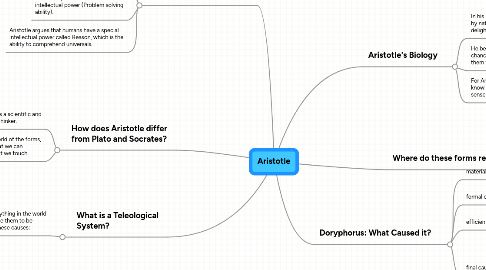Aristotle
by pamela gomez


1. How do our senses differ from the other animals?
1.1. All forms of life have nutritive, reproductive, and iocomotive power.
1.2. Animals differ by having the power of sensation and perception.
1.3. More complex animals have intellectual power (Problem solving ability).
1.4. Aristotle argues that humans have a special intellectual power called Reason, which is the ability to comprehend universals.
2. How does Aristotle differ from Plato and Socrates?
2.1. Aristotle is a scientific and practical thinker.
2.2. He does not believe in the world of the forms, but things that everything that we can understand are the things that we touch.
3. What is a Teleological System?
3.1. Aristotle believed that everything in the world has causes (things that drive them to be created). He provides for these causes:
3.1.1. Material Cause: The material from which the thing is made.
3.1.2. Formal Cause: The shape or form a thing must be in order to be recognized.
3.1.3. Efficient Cause: The actual force used to make the thing.
3.1.4. Final Cause: What is the ultimate purpose of the thing?
4. Aristotle's Biology
4.1. In his metaphysics, Aristotles states, "All men by nature desire to know. An example is the delight we take in our senses."
4.2. He believes that nature does nothing by chance. We have been given senses to use them to understand the world.
4.3. For Aristotle, to engage the problem of knowledge, we must begin with our senses.
5. Where do these forms reside?
5.1. Aristotle believes that the forms lie inside the things themselves.
5.2. For example, the form of the oak tree is inside the acorn.
5.3. Each thing that we see is part of a teleological (goal oriented) system.
6. Doryphorus: What Caused it?
6.1. material cause?
6.1.1. Marble
6.2. formal cause?
6.2.1. Nude is shown to show perfection, head is turned to show thoughts
6.3. efficient cause?
6.3.1. Chissel, marble, know mathematics
6.4. final cause?
6.4.1. to express phi
6.4.2. to teach
6.4.3. demonstrate strength as a virtue
6.4.4. Didactic
